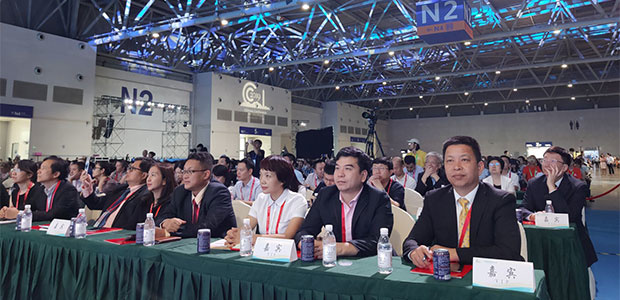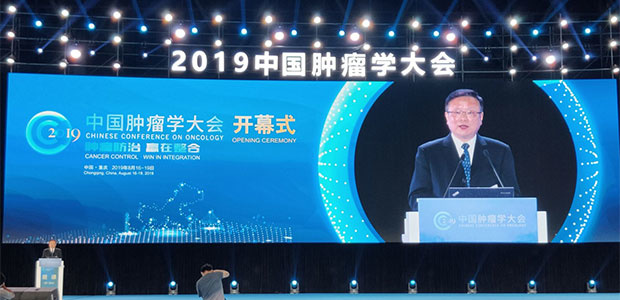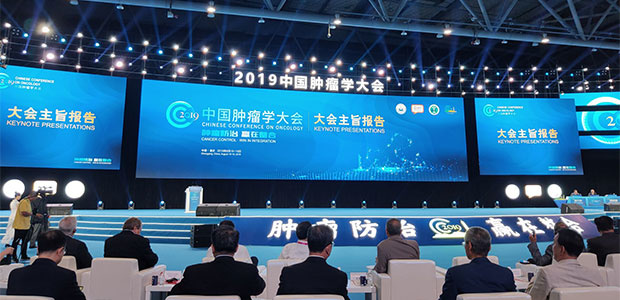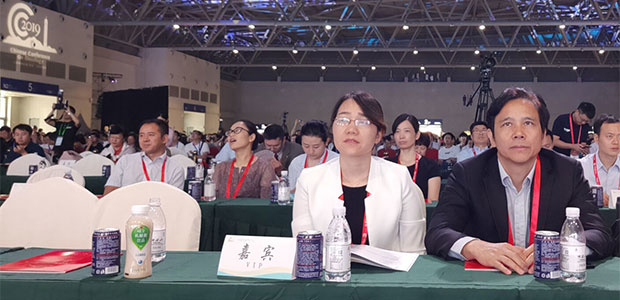-Singapore St. Stamford International Medical Group invited to attend 2019 Chinese Conference on Oncology
On Aug. 17, the opening ceremony of 2019 Chinese Conference on Oncology sponsored by the China Anti-Cancer Association was successfully held in Chongqing. As the largest academic conference in the field of oncology in China, the event was conducted with the highest standards and the widest coverage of academic disciplines. It focuses on the forefront of cancer prevention and treatment, and conducts extensive exchanges and discussions on new perspectives, new technologies and new methods in the aspects of cancer prevention, diagnosis, treatment and rehabilitation. It generates profound influence on the field of international oncology and has become the most important communication platform for experts and scholars expertize in oncology at home and abroad.

The delegation led by Mr. Lin Zhicheng, the chairman of St. Stamford International Medical Group( first from the right)
The conference will further enhance the scale and influence on the basis of previous sessions. Attendees includes more than 30 Chinese and foreign academicians, over 1,000 well-known scholars in the field of oncology at home and abroad, and more than 20,000 elites in oncology. As a member of China Anti-Cancer Association, Singapore St. Stamford International Medical Group was invited to the conference. A delegation composed of Mr. Lin Zhicheng, the chairman of the group, and other members attended the event.
At the opening ceremony, academician Fan Daiming, also the deputy dean of the Chinese Academy of Engineering, the foreign academician of the Institute of Medicine of the U.S. National Academies, and the vice chairman of China Anti-Cancer Association, first delivered a speech. The concept of integrative medicine proposed by academician Fan Daiming is a brand new, future-oriented comprehensive perspective, which guarantees the new thinking and new medical concept of human health in the whole cycle. Integrative medicine, leading the inevitable trend of future medical development, will march into a new era of the medical field.


On the conference
After the opening ceremony, the main venue successively carried out the keynote speech of the conference and two important academic activities of the Chinese and foreign academician forum. The keynote report focuses on the development of integrative medicine, precision medicine, and translational medicine and shares the latest research results. It also presents remarkable achievements in clinical and research era of cancer prevention, diagnosis, treatment and rehabilitation in China.

Dr. Peng Xiaochi (right) and Dr. Dai Wenyan (left)
Chinese and foreign academicians were invited to participate in academic exchanges in Chinese and foreign academicians forum. Attendees cover more than 5,000 delegates, among them, Peng Xiaochi, the leader of MDT (multidisciplinary team) of St. Stamford Modern Cancer Hospital Guangzhou and Dai Wenyan, the director of breast cancer ward, also conducted exchanges with other academicians, making joint effort to promote the global progress of cancer research.
In the afternoon, a delegation led by Mr. Lin Zhicheng, the chairman of the St. Stamford Medical Group, visited Chongqing and met academician Fan Daiming. An in-depth exchange was achieved during the visit. In September, 2017, academician Fan Daiming had visited the St. Stamford Modern Caner Hospital Guangzhou.
Fan commented: "Combining advanced treatment technology, multidisciplinary integration, individualized diagnosis and treatment for patients, St. Stamford Modern Cancer Hospital Guangzhou sets a good example. As an international JCI-accredited hospital, it has significant advantages in the diagnosis and treatment of cancer and achieved remarkable results. I wish that MCHG will go further in the course of integrative medicine and become a top-notch hospital in cancer treatment among joint venture hospitals."
*Surgery, in addition to the appropriate chemotherapy and radiotherapy, are effective in treating early cancer, but certain patients in late stage of cancer may not be tolerate surgery well as they can be relatively weak. A combination of carefully planned minimally invasive therapy, chemotherapy or radiotherapy can effectively reduce the side effects and discomfort of treatment and may help patient get better efficacy.













 viber
viber